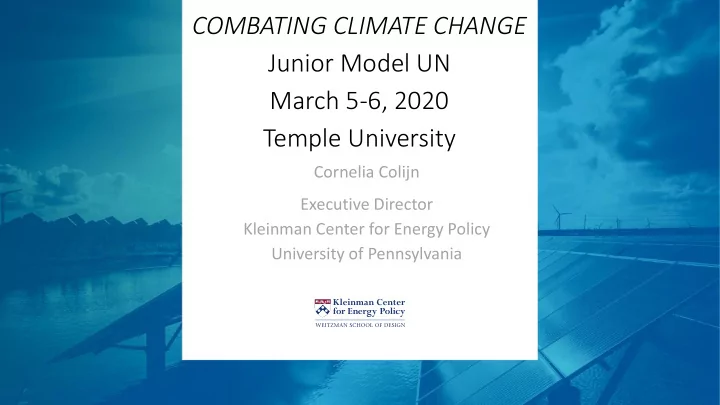

COMBATING CLIMATE CHANGE Junior Model UN March 5-6, 2020 Temple University Cornelia Colijn Executive Director Kleinman Center for Energy Policy University of Pennsylvania
How do you get to school? A. Walk A. 0 B. Bike B. 0 C. Car C. 1115 D. Bus (or other public transportation) D. 131 E. Carpool E. 459
3
Atmospheric CO2 over the last 1000 years: A high ‐ resolution record from the West Antarctic Ice Sheet (WAIS) Divide ice core Global Biogeochemical Cycles, Volume: 26, Issue: 2, First published: 26 May 2012, DOI: (10.1029/2011GB004247)
Pnas.org
Do you eat mostly… A. Vegetables/fruits A. 153 B. Meat B. 644 C. Bread C. 364
Drought “Drought is a slow - moving natural disaster that can wither crops, threaten endangered species and other natural resources, and disrupt public water supplies. Drought can also increase the likelihood of wildfires, pest infestations, even epidemics.” NOAA
Sea Level Rise “ Without cuts in carbon emissions, the ocean is expected to rise between 61cm and 110cm, about 10cm more than the earlier estimate. A 10cm rise means an additional 10 million people exposed to flooding, research shows.” The Guardian
Extreme Weather Carbon Brief's analysis suggests 68% of all extreme weather events studied to date were made more likely or more severe by human-caused climate change . Heatwaves account for 43% such events, droughts make up 17% and heavy rainfall or floods account for 16%
Flooding “From 1958 to 2016 heavy rainfall events have increased in the northeastern states by 55 percent, midwestern states by 42 percent, and southeastern states by 27 percent.” Ellen Gray & Jessica Merzdorf, NASA
"Biodiversity,” the panel declared, “is declining faster than at any time in human history. A million species are on the brink.” UN IPCC Biodiversity Panel Biodiversity Loss
How do you dry clothes? A. Hang to dry A. 0 B. Dryer B. 750 C. Both C. 375
Famine “The number of extreme climate-related disasters, including extreme heat, droughts, floods and storms, has doubled since the early 1990s, with an average of 213 of these events occurring every year during the period of 1990 – 2016. These disasters harm agricultural productivity of major crops such as wheat, rice and maize causing food price hikes and income losses that reduce people’s access to food.” United Nations Food and Agriculture Organization
Climate Migration “…for example we know that last year 24 million people were displayed by weather related disasters like floods and hurricanes.” Climate Migration Coalition
War/Disputes “In a scenario of 2 degrees Celsius of warming beyond preindustrial levels – the stated goal of the Paris Climate Agreement – the influence of climate on conflicts would more than double, rising to a 13% chance.” Stanford University, Woods Institute
Public Health Crisis “ Climate change will also affect infectious disease occurrence.” A number of diseases well known to be climate-sensitive, such as malaria, dengue fever, West Nile virus, cholera and Lyme disease , are expected to worsen as climate change results in higher temperatures and more extreme weather events.” Columbia University, Earth Institute
Do you turn off the water when brushing your teeth? • Yes • 34 • No • 274
Potential Solutions Adaptation & Mitigation Technology & Policy
Adaptation: Technology
Adaptation: Policy
Do you unplug appliances/chargers when not in use? A. Yes A. 9 B. No B. 18
Mitigation: Technology
Mitigation: Policy
Calculate Your Total! How can you reduce your carbon footprint?
Cornelia Colijn ccolijn@upenn.edu
Recommend
More recommend